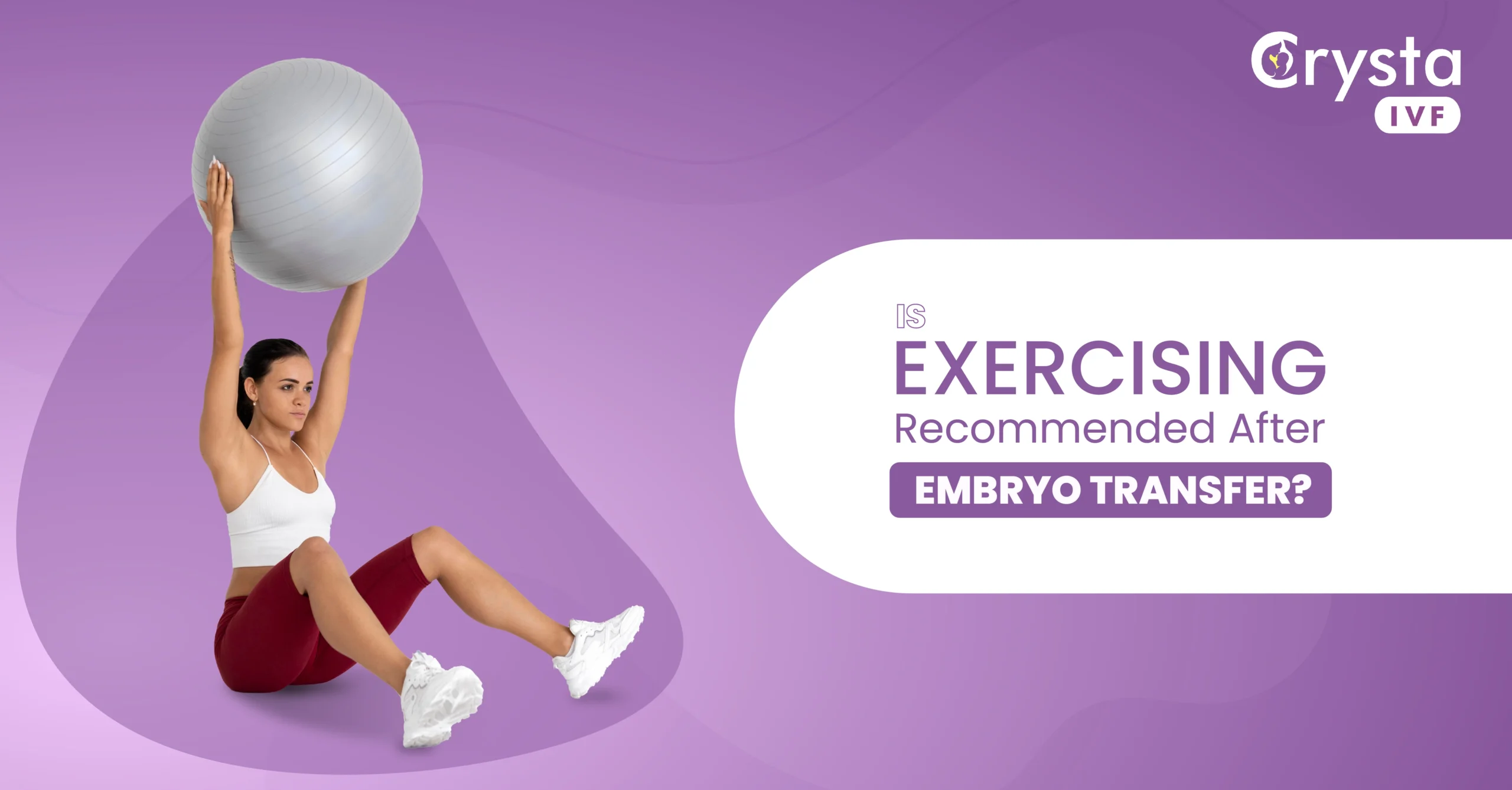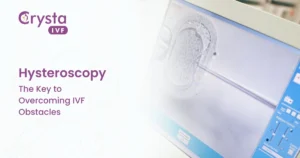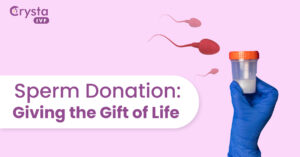Are you struggling with infertility and considering IVF treatment? If so, you’ve probably heard about the benefits of exercise and staying active for fertility. It’s indeed true that incorporating physical activity into your daily routine can help improve fertility in several ways, including managing your weight, addressing hormonal imbalances, boosting metabolism, and enhancing blood circulation, among other benefits. However, you might be surprised to learn that fertility treatments like IVF don’t always include exercise as part of the regimen.
It is recommended that a female avoid extensive exercise during embryo transfer. Light exercise is completely fine when some parts of IVF cycles are in process, whereas you may need to avert from the exercise in certain parts. This might be a little confusing as to which form of exercise to do or not and what guidelines to follow during embryo transfer to achieve a positive result.
Guidelines to follow exercise during embryo transfer
Here are the guidelines you must know before inculcating exercise into your routine during the embryo transfer:
Ask your doctor about the fitness routine
It is always a good idea to take some time to prepare before moving on to start any kind of fertility treatment such as IVF. Counselling before conception will assist you with preparing your body for fertility treatment and pregnancy as well. You must talk to your doctor about the physical exercise and what changes you need to make in your exercise schedule.
Ensure making a strike when it is about fertility and exercise as you don’t have to exert yourself too much otherwise, it may turn against you if you are not in the process of a fertility treatment cycle. Intense workouts aren’t recommended during embryo transfer and also when you are pregnant.
Take breaks during the IVF cycle
Your doctor might give you the go-ahead to exercise during the treatment cycle, but you must restrict yourself from exercising at some points. It is also recommended not to indulge in activity at all when the egg retrieval is in process. During this period, ovaries are enlarged because of the stimulation and it can lead to the risk of a condition known as ovarian torsion.
It is also suggested to avert the exercises and be careful for the two weeks after the embryo transfer. This could lead to initiating the embryo implantation problem. Hence, you mustn’t get yourself put into any sort of strenuous activity. It is essential to take breaks so that your body and mind get ready to tackle everything during and after the fertility treatment.
Avoid high-impact activity
When it comes to exercising and fertility treatments, doctors suggest that women must avoid including workouts that are of high impact when they are in the middle of the fertility treatment cycle. Heavy exercises such as weight lifting, interval training, running, and other high-impact activities lead to redirecting the blood circulation to the muscles and not to the eggs, ovaries, and uterus.
You can aim for these exercises for a certain time like:
- Tai chi
- Walking
- Swimming
- Yoga
- Meditation
- Restrict the time
According to a study, it is identified that regular workouts can impact IVF treatment success chances. It is specifically for the females who were involved in the exercises for more than four hours or more every week. You have to ensure you follow the routine of around 30 minutes when you get yourself indulged in the exercise.
Low-intensity activities for stress-relief
If you are an individual who has always been involved in exercise and depends on physical activity for stress relief, then you can try finding ways to channel that energy. If you are in-between the process of IVF cycles it is important to ensure getting yourself indulged in the light exercise that can assist you with calming your mind and make you feel anxious-free. You can try activities such as cycling, gardening, yoga, meditation, music, etc.
When to start Exercise after an embryo transfer?
Exercising on a regular basis before embryo transfer is useful in enhancing the probability of conception. After the treatment begins, it is essential for you to alter the routine to create the conditions that are causing pregnancy to happen. Additionally, it is essential to get in touch with your IVF doctor when there are concerns.
Not sure whether you should include exercise in your routine or not after the embryo transfer? Yes, you can, but there are certain things that you have to keep in mind such as:
- First, understand how active you were before considering the IVF procedure.
- Understand and discuss everything about the treatment you used before the embryo transfer.
Certainly, running a marathon wouldn’t be a good idea, but that doesn’t mean you restrict yourself to bed rest all day. Research suggests, around a 40% of reduction in medical pregnancy rates for females who are always in bed instantly after the embryo transfer.
As per the statistics, infertile females have lower abdominal temperatures than fertile females, that probably is because of blood flow that is impaired in the uterus. You can involve yourself in activities such as standing, walking, and exercise helps with blood flow and contractions in the muscles. Good blood flow is equal to better oxygen throughout the body promoting healthy cells and tissue development. Hence, the successful implantation entirely relies on your efficiency of staying active.
When to start Exercise Before frozen embryo transfer(FET)?
The timing for starting exercise before a frozen embryo transfer (FET) can vary from woman to woman and recommendations from your healthcare provider. Generally, women start exercising two weeks before embryo transfer. Here are some general guidelines to keep in your mind and they are:
- Do not get involved in strenuous exercise
- Talk to your doctor
- Avoid taking stress
- Listen to your body, if you feel any discomfort reach out to your doctor
Risks linked to exercise during and after embryo transfer
It is always better to consider the probable risks and consult the clinical professional before initiating the new exercise routine. It is recommended to restrict and completely avert the high-intensity interval training or HIIT including a heavy cardio regime when the IVF treatment is in the process. Basically, you must always be staying away from the activities that can lead to injuring your abdomen or uterus and can affect egg formation.
Final words
Exercise in your daily routine is a very good habit you can ever include in your lifestyle. But if you are experiencing infertility and have decided to get the IVF treatment done, then you need to get yourself familiar with certain things. There are a good number of recommendations made in the write-up for you so that you are familiar with everything. You must ask your doctor most importantly because they can guide you better about which exercise you must include and what not during and after embryo transfer. Always follow the routine that has been recommended to you.
Crysta IVF is the fertility expert and one of the best IVF Centers in Pune fulfilling the parenthood dream for couples who have given up their fight with infertility. We make sure that they win and their lives are loaded with contentment, satisfaction, joy, and full of happiness all around with their little munchkin. And we do this with our integrated team of infertility specialists who not only exert themselves to ensure the success of the treatment but also emphasize giving their utmost support throughout the journey to couples. Our latest and advanced technology helps us with offering excellent infertility treatments like IVF, IUI, ICSI, donor programs, etc. If you are also seeking help for infertility, then you need to consult us so that we can make everything smoother for you.




